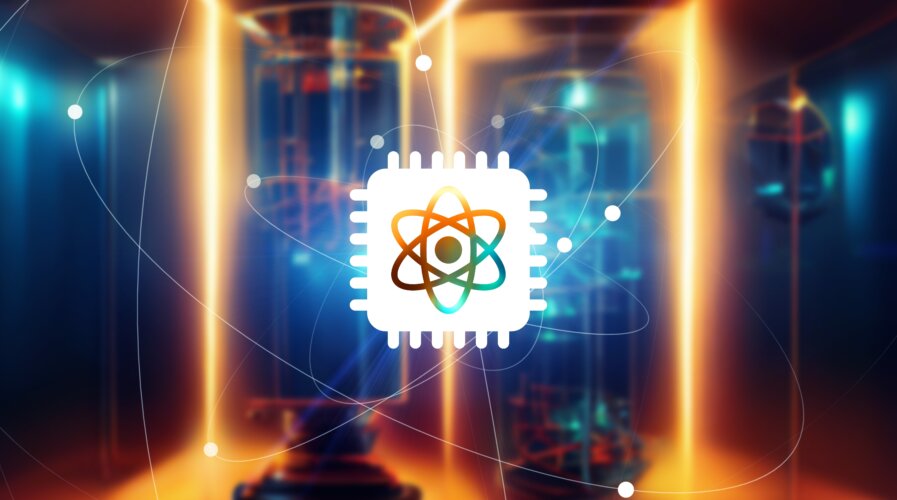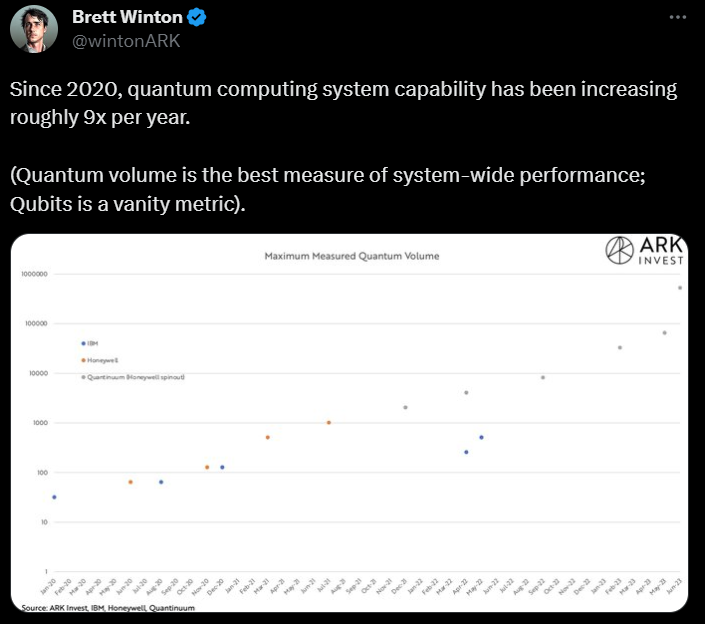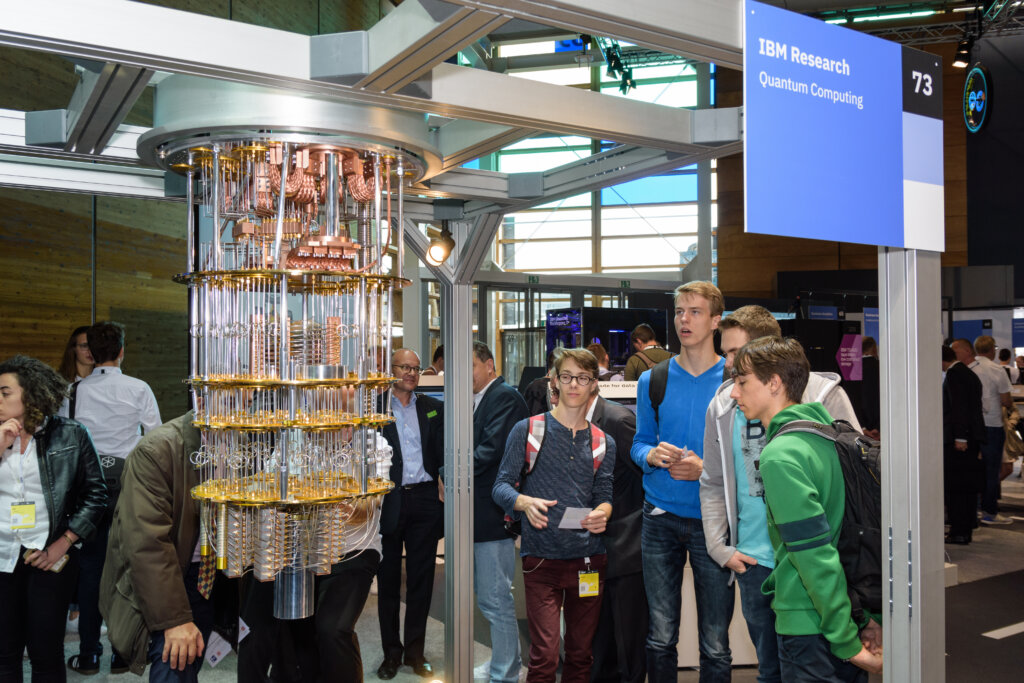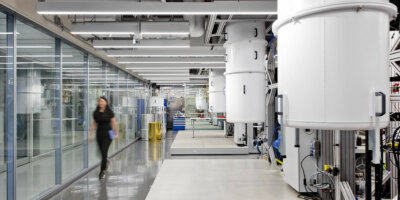
How do we explain quantum computing and the major role AI will play? (Source – Shutterstock)
It’s confusing, but here’s a deep dive into the state of quantum computing
|
Getting your Trinity Audio player ready... |
- AI and quantum computing merge, unlocking potential in healthcare and energy.
- Generative AI propels quantum tech, with challenges and immense industry promise.
AI’s influence has been subtly woven into various aspects of our daily lives, from smartphone tech to autonomous car features and innovative retail experiences. Its seamless integration, especially with the rise of generative AI, has recently become a prominent fixture.
Tools like ChatGPT, GitHub Copilot, and Stable Diffusion have captivated global audiences due to their wide-ranging applications and profound conversational capabilities.
Interestingly, generative AI is poised to push quantum computing beyond mere aspirations to achieve quantum supremacy, a point where quantum computers significantly outpace classical methods.
The symbiotic relationship with AI
By integrating AI with quantum computing, the already remarkable capabilities of the latter in solving intricate problems could become even more accelerated and precise. Such a synergy could bring AI from being merely impressive to a monumental game-changer.
When operational, quantum computers have the potential to boost processing speeds exponentially, deepening our comprehension of everything from intricate molecular designs to the multifaceted interactions between systems, such as urban movement, economies, and climatic patterns.
These advances could pave the way for breakthroughs in curing ailments like cancer and Alzheimer’s and in pioneering sustainable energy solutions. The allure of quantum computing’s potential is undeniably compelling.
Furthermore, quantum computing aligns seamlessly with AI. While AI offers self-enhancement and learning capabilities, quantum computers provide unmatched speed and potency.
Google’s Sundar Pichai aptly remarked, “AI can fuel quantum computing, and in turn, quantum computing can propel AI forward.”
AI went through a stagnant phase for years, termed the “AI winter.” Although they outperformed humans in specific tasks like chess, their over-promotion led to underwhelming results. However, the leaps in generative AI since the mid-2000s indicate that we’re entering a renaissance era for machine learning.
Quantum computers might soon follow this trajectory. As Professor Giulio Chiribella from the University of Hong Kong suggests, they could become “a pinnacle of human innovation and the pursuit of knowledge in this millennium.”
As per the SNS Insider report, the Quantum Computing Market had a valuation of US$ 725.53 million in 2022. The report projects that it will expand significantly to reach US$ 7587.28 million by 2030, with an anticipated compound annual growth rate (CAGR) of 34.1% during the forecast period from 2023 to 2030.
Ongoing research and advancements in quantum technology and algorithms suggest that quantum computing is on the brink of reshaping our future. Crafting a fully operational quantum computer is a monumental challenge, as they function on principles distinct from the digital devices we’re accustomed to.
The essentials that explain quantum mechanics in computing
Before delving into the broader impact of quantum mechanics, a basic understanding of its components is essential. Quantum mechanics is a branch of physics that deals with the smallest particles of the universe, like atoms and subatomic particles. At this scale, many of the classical laws of physics we’re familiar with either don’t apply or manifest very differently.
Some fundamental principles of quantum mechanics influencing quantum computing include wave-particle duality, the uncertainty principle, and quantum superposition.
In computing, quantum mechanics offers new ways to process information. Unlike classical computing, where information is binary and deterministic, quantum information is probabilistic. This means quantum computers can represent and process vast information simultaneously, given the unique properties of quantum bits (qubits).
When talking about classical bits, in classical computing, a bit is the smallest unit of data and can exist in one of two states: 0 or 1. All operations in a computer, from the simple act of typing to running complex simulations, are ultimately broken down into binary operations that use these bits.
In quantum computing, however, a qubit (quantum bit) is the fundamental unit of quantum information. Unlike classical bits, qubits can be in a state representing 0, 1, or any quantum superposition of these states. This means they can perform many calculations simultaneously, making quantum computing vastly more powerful than classical computing.

An X user demonstrating how quantum computing is improving year by year. (Source – X)
Two intriguing aspects of quantum mechanics – superposition and entanglement – play a crucial part in quantum computing.
Superposition is one of the hallmark principles of quantum mechanics. It means that, unlike a classical bit that must be either 0 or 1, a qubit can be 0, 1, or both 0 and 1 at the same time. Think of it like a spinning coin; while in the air, you can’t definitively say it’s in a ‘heads’ or ‘tails’ state—it’s as if it’s in a blend of both. It only takes on a definite state when the coin lands (or is measured in quantum terms).
Entanglement is another uniquely quantum phenomenon. When qubits become entangled, the state of one (whether 0 or 1) will instantly influence the state of the other, no matter the distance between them. This strong correlation exists even if the qubits are separated by vast distances, a phenomenon Einstein famously called “spooky action at a distance.”
In computing terms, entanglement enables entangled qubits to work together like classical bits cannot, making certain computations much more efficient.
These quantum principles, combined with qubits’ unique properties, provide the foundation for quantum computing. While the field is still in its infancy and practical, scalable quantum computers remain challenging to build. Their potential speed and computational power advantages are immense and could revolutionize many areas, from cryptography to drug discovery.
Explaining the hurdles and solutions in quantum computing
Jungsang Kim, CTO of IonQ, dedicated almost two decades to the challenges of qubit development. He mentioned the often-untold truth about qubits: while you can possess countless qubits, they alone don’t make a quantum computer, according to South China Morning Post. Two primary elements are essential. Firstly, the ability to instruct the computer and its capability to consistently produce accurate results. The current hurdle in quantum computing is the magnitude of errors.
When you command a quantum computer to perform a particular operation, the imperfections in its hardware become evident. Eventually, noise becomes the dominating factor, leading the computer to execute random actions.
Regardless of the number of qubits, the output will be nonsensical if a quantum computer acts unpredictably.
However, there’s a relatively straightforward solution to this qubit conundrum: error correction. It’s estimated that around 90% of a quantum computer’s computational capacity will be required to rectify qubit mistakes. Despite the complexities, quantum error correction is achievable with the right algorithms.
IonQ, considered a front-runner in quantum computing, utilizes a “trapped ion” technique to qubits with ytterbium atoms. Though Kim is optimistic about progress in this decade, the field remains competitive with various methodologies in play.
Many notable companies, such as Amazon Web Services, Google, and IBM, are making strides in creating superconducting qubit machines. They have garnered attention because of their unique cooling structures that stabilize unstable qubits.
Whichever technique emerges first, addressing the inherent challenges in quantum hardware, like fault tolerance, will be challenging.
The potential quantum leap in various industries
When fully operational, quantum computers hold the potential to revolutionize industries. For instance, we could witness considerable advancements in battery technology. Recognizing this potential, the automotive sector is already joining forces with quantum computing trailblazers, leading to partnerships like Daimler with IBM.
Kim emphasizes the transformative potential in battery energy density improvements. Such advancements could make electric vehicles considerably more appealing than their fossil fuel counterparts, paving the way for significant strides in addressing climate change.
Kim also highlights the potential of quantum computing to enhance our understanding of nitrogenase, a bacterial enzyme. Unlocking its secrets could drastically reduce energy consumption in fertilizer production.
Quantum computing could also offer insights into carbon capture and storage, further aiding the fight against global warming. Additionally, it could revolutionize drug development at a molecular level, leading to personalized treatments and novel vaccines.
We are currently in the NISQ (Noisy Intermediate-Scale Quantum) era, anticipating a defining moment where quantum computers outperform classical ones.
Google’s 53-qubit Sycamore machine has significantly advanced our understanding of the world. This comprehension brings us closer to unraveling the intricate tapestry of the universe and underscores the importance of synergy between various scientific domains.
As technological advances continue, the distinction between quantum mechanics – a field traditionally reserved for physicists – and practical, daily applications begins to blur. This convergence necessitates a collaborative approach, pulling expertise from computer scientists, engineers, and physicists alike.
Preparing for a quantum future: Beyond the technology
Preparing for a quantum future involves not just investment in technology. For quantum computing to flourish, we need a workforce that understands its principles and can navigate its complexities. It’s not just about creating quantum computers but ensuring a pool of talent that can maximize their potential, develop new applications, and address unforeseen challenges.

IBM is one of the key players in the quantum computing industry. (Source – Shutterstock)
Moreover, the economic implications of quantum computing are vast. Countries and corporations that invest early and heavily in quantum research stand to gain a competitive edge in numerous sectors. However, with such advantages also come risks. As quantum computers threaten current encryption methods, it’s paramount to develop quantum-resistant cryptographic techniques to ensure global data security concurrently.
The rise of quantum computing represents more than just a technological revolution; it’s a societal one. As we progress, the emphasis shouldn’t solely be on hardware and software but on ensuring that this transition benefits humanity.
It’s crucial to maintain an open dialogue, drawing insights from experts and the public alike, to shape the future of quantum computing. This future promises to reshape our world in ways we’ve only begun to imagine.
READ MORE
- Safer Automation: How Sophic and Firmus Succeeded in Malaysia with MDEC’s Support
- Privilege granted, not gained: Intelligent authorization for enhanced infrastructure productivity
- Low-Code produces the Proof-of-Possibilities
- New Wearables Enable Staff to Work Faster and Safer
- Experts weigh in on Oracle’s departure from adland


